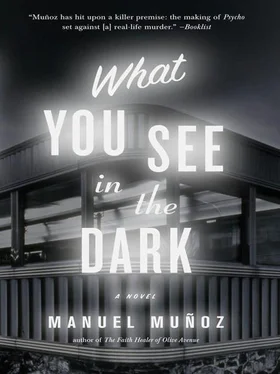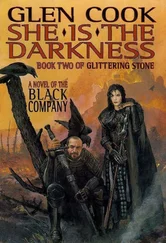Teresa served him dinner once — just once — a small bowl of beans with onions and two corn tortillas, which Cheno ate with relish, his thanks never ending. He refused a second plate. It was getting dark, he told her, and it was best he got home. She watched him from the window as he went down the street, hurrying, and part of her wondered if his secrecy was meant to protect her, to keep anyone from seeing a strange man close the green door at the base of the stairwell.
She knew he was going to ask her to marry him. Not soon, but one day. What she felt for him was affection, not love: she liked the thrill of pulling him closer and closer, then the slight edge of relief when their guitar lessons were over for the night. There were days he stayed away and Teresa knew he’d gone back up into the northern parts of the Valley to make money, but even so, she didn’t want to leave the safety of her single room. It was hers and she was a twenty-three-year-old woman walking down the street and she was no longer Alicia’s daughter.
“Do you sing?” he asked her in Spanish.
She was about to say yes but realized that the songs she hummed to herself were all in English. She didn’t know how he would take this. “Sometimes.”
“Would you sing me something?” He took the guitar and, surprisingly, began to strum something she recognized, a Patsy Cline song. She laughed and shook her head, refusing, but he kept playing the chords over and over until finally she complied, the song she knew so well from the dim glow of the radio, which she left on at night to lull her to sleep. She sang “Walkin’ After Midnight,” casting her eyes over at the open window, remembering her mother and how the room had to be quiet when her records played, the only sound the pain in those women’s voices.
“Que lindo,” Cheno said when they finished.
“Gracias,” she answered, and she was not surprised when Cheno reached over and touched her hand. She could feel the thin plastic of the guitar pick between his fingers, his touch light and unsure.
“We should sing together,” he told her in Spanish.
“What song?”
“No,” he said. “I mean in public. At El Molino Rojo.”
“Why there?”
“So we can earn some money,” he answered. He kept his hand on hers, very light, as he would have done if he’d emerged from the secret shadow where he stood watching her in front of Stewart’s Appliances, reading her desires in the shows flickering across the screen, touching her shoulder. He was asking her for complicated reasons, Teresa knew — to fulfill her dreaming, yes, but also to make their work a joint effort, not just his own sweat in the field.
“But how?” she asked.
Someone on the corner had urged him to go audition at El Molino Rojo, where the bar owner let people sing for tips. Cheno’s plan was to go there on Tuesday afternoon, her day off from the shoe store, and meet her there once he finished whatever fieldwork he’d managed to get that day. She knew what side of town he was talking about, the avenue over on the west. Over there was El Molino Rojo. The Wild Horse. The Bluebird. The clientele went to the bars where they could pronounce the names. The signs in English glowed amber at night, an electric necklace of shimmering bulbs, some of them buzzing neon: the Fiddle, and Rosie’s with the namesake petals blooming in light. The Mexicans went to the cantinas with names beautiful and full of promise, even if the buildings were tucked away in the dark, no neon to speak of. El Club Diamante. El Paraíso. Teresa’s mother had spoken of cantinas in Texas with names that sounded just as regal. El Presidente. Las Angelinas. Saturday night the one night of the week for elegance, for the dress made from expensive-looking fabric purchased at the TG&Y. Such places! Such names! Why hadn’t the idea occurred to Teresa first, all those afternoons dreaming in front of Stewart’s, as if her mother had never given her stories about the cantinas up and down the state, over there near San Antonio, near Temple. La Lupita, La Conga. Even the little towns past the onion fields and the sweet potatoes had cantinas. Beeville, Kenedy, Mathis, and on to Corpus Christi. El Siete de Copas. El Espejo. El Gato Negro. El Peek-a-boo.
There was no reason, really, to go against Cheno. Women sang in bars like that. People watched them and listened. Old blues songs or honky-tonk or country or ranchera ballads, laments in the native tongue of the clientele. So she agreed to meet in front of El Molino Rojo the following Tuesday afternoon, her day off work, and when the day arrived, she pressed her white blouse and her denim skirt and smoothed her hair in the bathroom mirror. Then she picked up her small guitar with no case and no strap and went down the stairs, emerging into the white heat of the afternoon, the men on the corner too drunk by this time of day to notice her.
At the far end of Union Avenue, El Molino Rojo stood near an intersection, tucked in a bit from the road. The building was unassuming, a small shack with dark windows and a flat roof, rough wood siding, tall yellowed weeds growing along the edges of a gravel driveway, the bare signage scripted badly by someone’s shaky hand. Teresa walked across the gravel parking lot, even though the door to the building was shut, and ducked under the faint shade of the roof’s overhang. The street was quiet.
She put her hand against the dark windows, trying to see inside, and felt foolish about knocking. Cheno was nowhere in sight. Teresa rested the guitar against the wall and fanned herself. Her stomach gurgled with hunger and she wondered how long she should wait before turning around and walking back home.
A black Ford truck slowed and pulled into the gravel lot across the street. The driver shut off the engine, and the dust from the driveway settled as he stepped down and made his way to the front door. He was tall — Teresa could tell that even from across the street — and he rattled the heavy chains that served as a lock to the cantina before pulling the door open, its metal growling against the cement. He stepped inside without shutting the door behind him.
The street went quiet again. Teresa looked at the building’s sign: LAS CUATRO COPAS. Its door stood gaping open, as if it had swallowed the man forever. She could hear the ticks of his Ford pickup as its engine settled and cooled.
The man emerged from the dark interior. He was looking at her, finally raising his hand to shade his eyes as if it might help him see. Teresa remained motionless, embarrassed now that she was out in the open. The man stepped outside and began walking toward her, his boots crunching on the gravel driveway, not looking before he crossed the street.
Halfway across the parking lot of El Molino Rojo, he called out to her, “You waiting for Ed?”
Teresa didn’t know whether to shake her head no or speak to him, but he crossed the rest of the parking lot in no time at all. He glanced down at her guitar. “You waiting for Eduardo?”
“The manager, yes,” she said.
“That’s Ed, then.” His eyes remained fixed on the guitar. “You’ll be waiting for a while. He doesn’t come in until much later on Tuesdays. Nobody drinks this early on a Tuesday.”
“Oh,” she said, trying not to pause, as if to suggest that Ed had been expecting her. “I figured I would just wait for him.”
“You singing for him?” He didn’t give her a chance to answer. “He’s got too many people already. Everybody and their mother thinks they can sing a song.”
She straightened a little when he said that, and the man took her posture for apprehension.
“I didn’t mean it like that,” he said. “It’s just that … well, I can’t tell you how many people show up and ask Ed to let them sing for tips.”
Читать дальше












